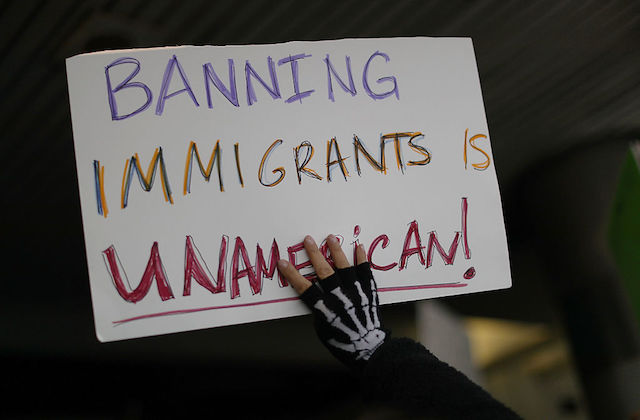Trump Administration Expands Travel Ban
Now nationals of eight countries are barred from entering the United States.
By Kenrya Rankin Sep 25, 2017

Following three days of tweeting from President Donald Trump that National Football League team owners should “fire or suspend” players who protest police violence, his administration quietly released an updated version of his “Muslim ban” on Sunday (September 24) night.
Concerns of discrimination regarding the previous iteration of the travel ban—which bars entry to all refugees and nationals of six mostly Muslim countries (Iran, Libya, Somalia, Sudan, Syria and Yemen) who don’t have a government-defined “bona fide relationship” with a person or entity in the United States—are scheduled to be argued before the Supreme Court on October 10. But the citizen ban expired yesterday (September 24), and the refugee ban will expire on October 24.
The updated ban restricts travel for visitors from eight countries: five of the original six (Sudan is not included in this version), plus Chad, North Korea and Venezuela. It’s set to go into effect on October 18.
The restrictions are tailored by country, with entry suspended for nationals of Chad, Libya, North Korea, Syria and Yemen as immigrants and nonimmigrants on business or tourist visas.
Nationals of Iran are barred as immigrants and nonimmigrants, but people traveling on student and exchange visitor visas will be permitted entry, while being “subject to enhanced screening and vetting requirements.”
People from Somalia are barred as immigrants; those seeking to travel as nonimmigrants are “subject to additional scrutiny to determine if applicants are connected to terrorist organizations or otherwise pose a threat to the national security or public safety of the United States.”
And the restriction on Venezuelans is limited to government officials who are “involved in screening and vetting procedures,” and their immediate families.
As The Washington Post reports, administration officials maintain that the ban is not meant to keep Muslims out of the United States. From The Post:
Critics of the administration have argued that the travel bans are an unconstitutional attempt to deliver on Trump’s campaign promise of “a total and complete shutdown of Muslims entering the United States.” Administration officials deny that any of the bans were aimed at Muslims, saying they are based on security concerns about visitors from countries with failing or weak governments.
“The restrictions either previously or now were never, ever ever based on race, religion or creed,’’ one senior administration official said. “Those governments are simply not compliant with our basic security requirements.”
Anthony D. Romero, executive director for the American Civil Liberties Union—which is set to argue that the ban is discriminatory before the Supreme Court next month—is not convinced.
“Six of President Trump's targeted countries are Muslim. The fact that Trump has added North Korea—with few visitors to the U.S.—and a few government officials from Venezuela doesn’t obfuscate the real fact that the administration’s order is still a Muslim ban," he said in a statement. "President Trump’s original sin of targeting Muslims cannot be cured by throwing other countries onto his enemies list.”
